Starting the day with the best breakfast for runners can significantly enhance their performance. The perfect morning meal for a runner includes a balanced mix of carbohydrates, proteins, fats, and hydration to adequately fuel the body for the demands and endurance required by running.
Runners need a nutrient-rich breakfast that sustains energy levels, supports muscle repair, and keeps blood sugar levels stable to prevent mid-run crashes. Understanding the critical role of the day’s first meal, many runners establish a morning routine that features top choices like oatmeal, bananas, or eggs—each providing unique benefits for sustained energy, muscle functionality, and overall health.

The concept of a “runner’s breakfast” extends beyond just filling up calories. It is a strategic approach to eating that can positively impact training outcomes and recovery. Research on marathon runners’ eating patterns indicates that a substantial breakfast can increase one’s ability to perform and recover. Foods rich in complex carbohydrates, moderate in protein, and low in fat provide an efficient energy source crucial for endurance activities. Timing and portion size are also important factors to consider, ensuring the body has enough time to digest and convert food into usable energy before a run.
Key Takeaways
- A balanced breakfast aids performance and recovery for runners.
- Strategic meal choices impact training outcomes positively.
- Timing and portion size are vital for pre-run nutrition.
Quick Navigation
Understanding the Best Breakfast for Runners
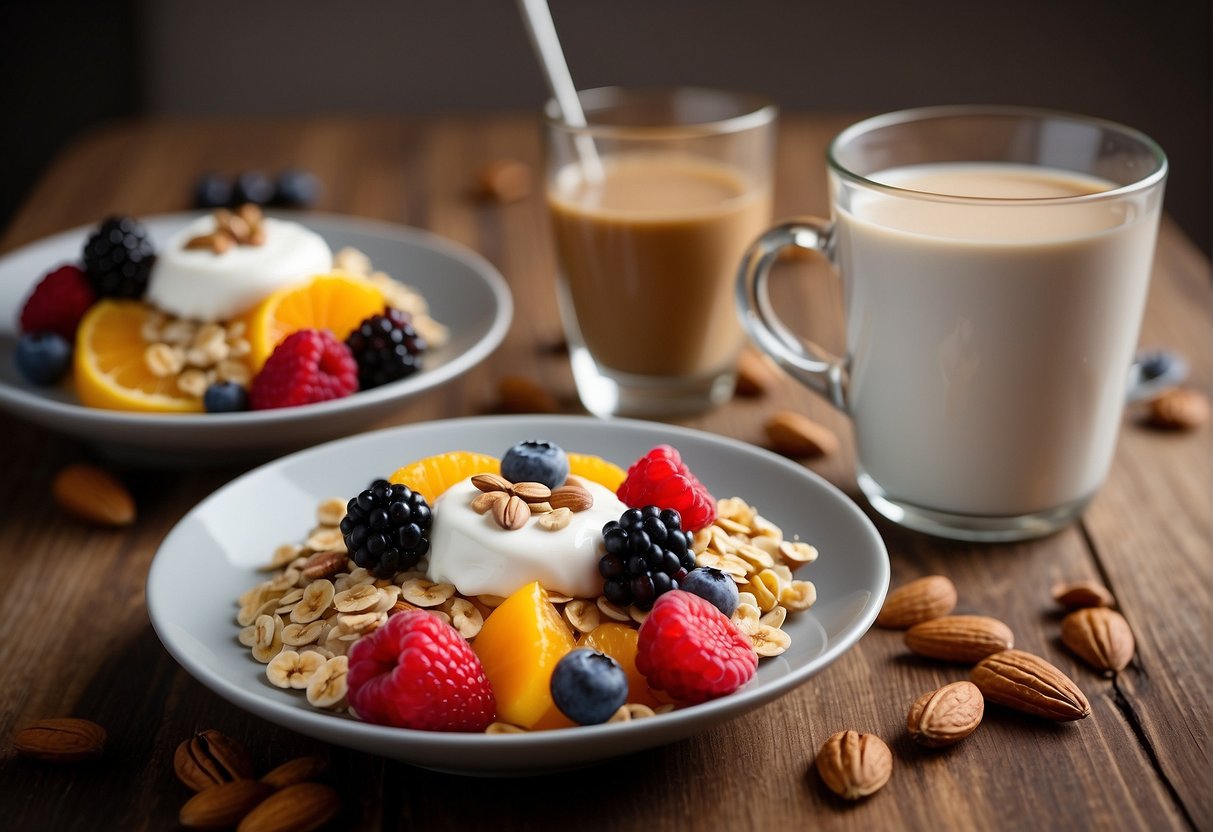
Optimal nutrition is critical for runners as it directly impacts performance, recovery, and overall health. A runner’s diet must strategically balance carbohydrates, proteins, and other nutrients to fuel workouts and aid in muscle repair.
Importance of Nutrition for Runners
Nutrition plays a pivotal role in a runner’s performance and their ability to recover. A well-planned diet ensures that runners have the necessary energy for long runs and intense workouts while supplying the nutrients needed for recovery and adaptation.
Carbohydrates and Endurance
Carbohydrates are a runner’s main source of energy. They are stored as glycogen in muscles and the liver and are the preferred fuel during moderate to high-intensity workouts. Consuming a mix of complex carbs, such as whole grains, is best for sustained energy release.
- Examples of complex carbohydrates:
- Oatmeal
- Brown rice
- Quinoa
- Whole-grain pasta
Proteins and Muscle Repair
Proteins are essential for muscle repair and recovery, especially after a strenuous run. They provide the amino acids needed to rebuild muscle fibers and facilitate recovery.
- Optimal sources of protein:
- Lean meats
- Fish
- Eggs
- Legumes
For additional information on the relationship between training and diet, as well as nutritional requirements, explore these resources: The conceptual relationship between training and eating in high school distance runners and Nutritional Requirements for Distance Runners.
Essential Components of a Runner’s Breakfast
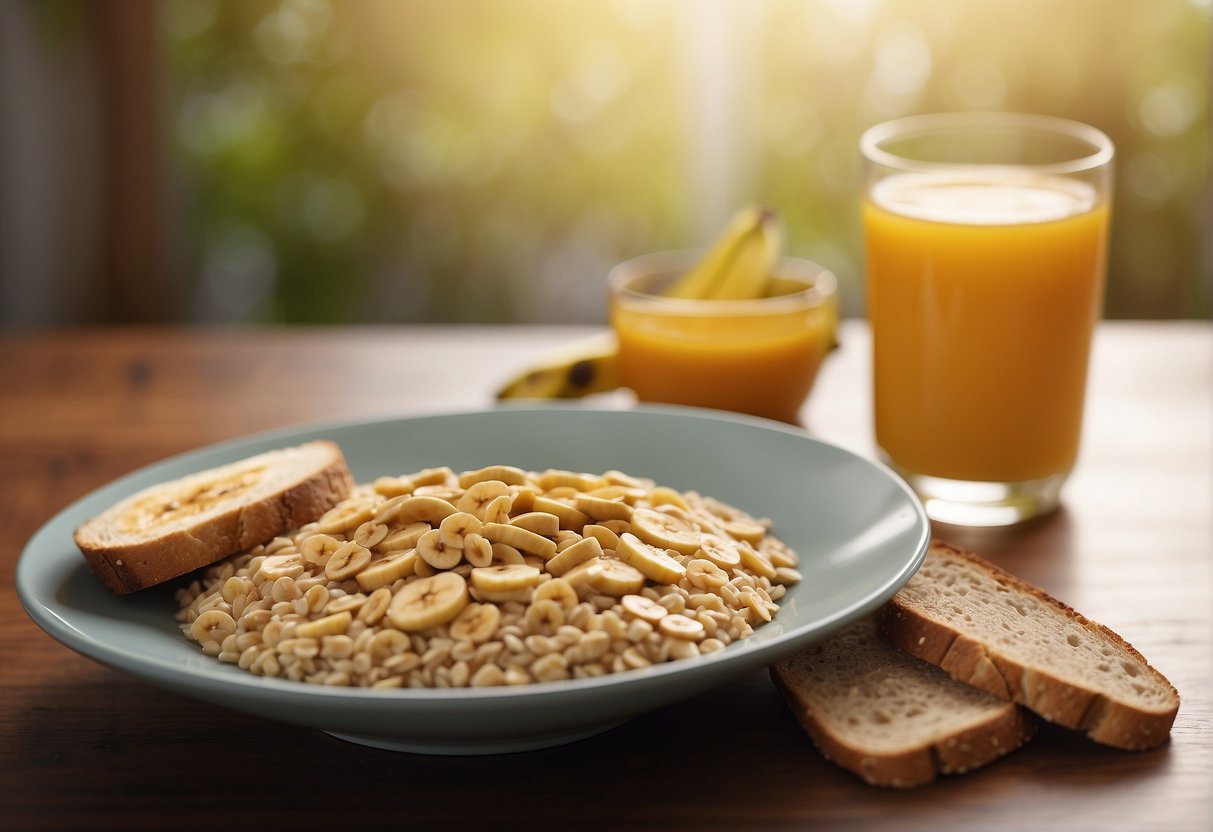
A runner’s breakfast should strategically fuel the body and promote recovery. It must include a balance of macronutrients and maintain proper hydration and electrolyte levels for optimal performance.
Balancing Macros for Energy and Health
Macronutrients—proteins, carbohydrates, and fats—are the cornerstone of a runner’s meal, especially breakfast. Proteins are crucial as they contribute to the repair and rebuilding of muscles after a run. Including options such as eggs or Greek yogurt can ensure a high-protein start to the day. Carbohydrates are a runner’s primary energy source, focusing on complex carbs like oatmeal or whole-grain bread to provide a steady release of energy. Fats, particularly healthy fats like those found in avocados or nuts, supply long-lasting energy and are essential for absorbing fat-soluble vitamins.
- Proteins: 15-25%
- Carbs: 45-65%
- Fats: 20-35%
Hydration and Electrolytes
Hydration at breakfast goes beyond water. A runner should incorporate fluids that provide electrolytes—minerals like sodium, potassium, magnesium, and calcium, to support nerve function and muscle contractions. This can include milk or a homemade electrolyte drink. It’s not just about drinking fluids; many fruits and vegetables have high water content as well as essential electrolytes.
- Hydration: at least 2 cups of fluid
- Electrolytes: through drinks or food high in sodium, potassium, magnesium
Best Breakfast for Runners: Foods
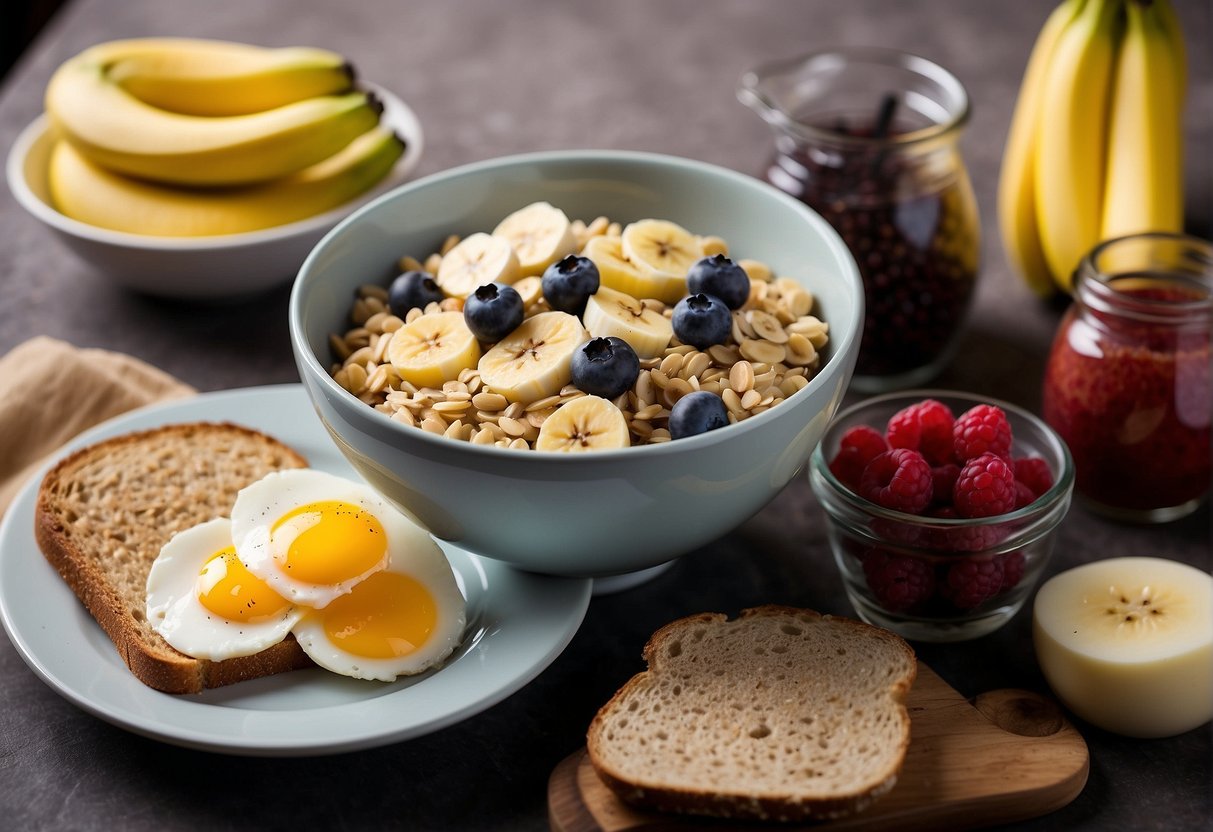
A well-composed breakfast can give runners the necessary fuel to start their day, supporting energy needs and recovery. Here, you’ll discover foods packed with valuable nutrients and effective combinations designed to optimize performance.
Nutrient-Rich Whole Foods
Oatmeal: A staple for many athletes, oatmeal is an excellent source of complex carbohydrates that supply a steady release of energy. Old-fashioned or steel-cut oats are often recommended for minimal processing and higher fiber content.
Eggs: Eggs contain high-quality protein and essential amino acids contributing to muscle repair and recovery. They also provide vitamins and minerals, such as vitamin D and choline, which are important for runners.
Greek Yogurt: This thick, creamy yogurt is a good protein source and contains probiotics, which can aid digestion. Opt for plain Greek yogurt to avoid added sugars and complement it with fruits or nuts.
Berries: Packed with antioxidants, berries like strawberries, blueberries, and raspberries help combat oxidative stress that runners may experience.
Nuts and Seeds: These provide healthy fats, protein, and fiber. Chia seeds, flaxseeds, almonds, and walnuts are particularly beneficial.
Bananas: Known for being rich in potassium, they help with muscle function and prevent cramping, which is especially crucial for runners.
Effective Best Breakfast for Runners Combinations
For a well-balanced breakfast, runners should look for combinations of foods that provide a mix of carbohydrates, protein, and healthy fats.
- Whole-grain toast with Nut Butter and Banana: The toast offers complex carbs, while the nut butter provides protein and healthy fats. Top with banana slices for a potassium boost.
- Smoothie with Greek Yogurt, Berries, and Seeds: For a quick and easy option, blend Greek yogurt with berries and a tablespoon of chia or flaxseeds. You’ll get protein, omega-3 fatty acids, and a variety of vitamins and minerals.
- Oatmeal topped with Nuts, Seeds, and Berries: This powerhouse combination gives you sustained energy from the oatmeal, while the nuts and seeds add texture and essential fatty acids. Berries contribute a sweet flavor along with antioxidants.
- Avocado toast on Whole-grain Bread: For those who prefer savory, a slice of whole-grain bread topped with mashed avocado provides heart-healthy monounsaturated fats and fiber.
- Vegan Option: A tofu scramble with vegetables like spinach, mushrooms, and tomatoes on whole-grain bread can be an excellent alternative for those following a vegan diet, ensuring a good intake of protein and micronutrients.
Quick and Easy Breakfast Ideas
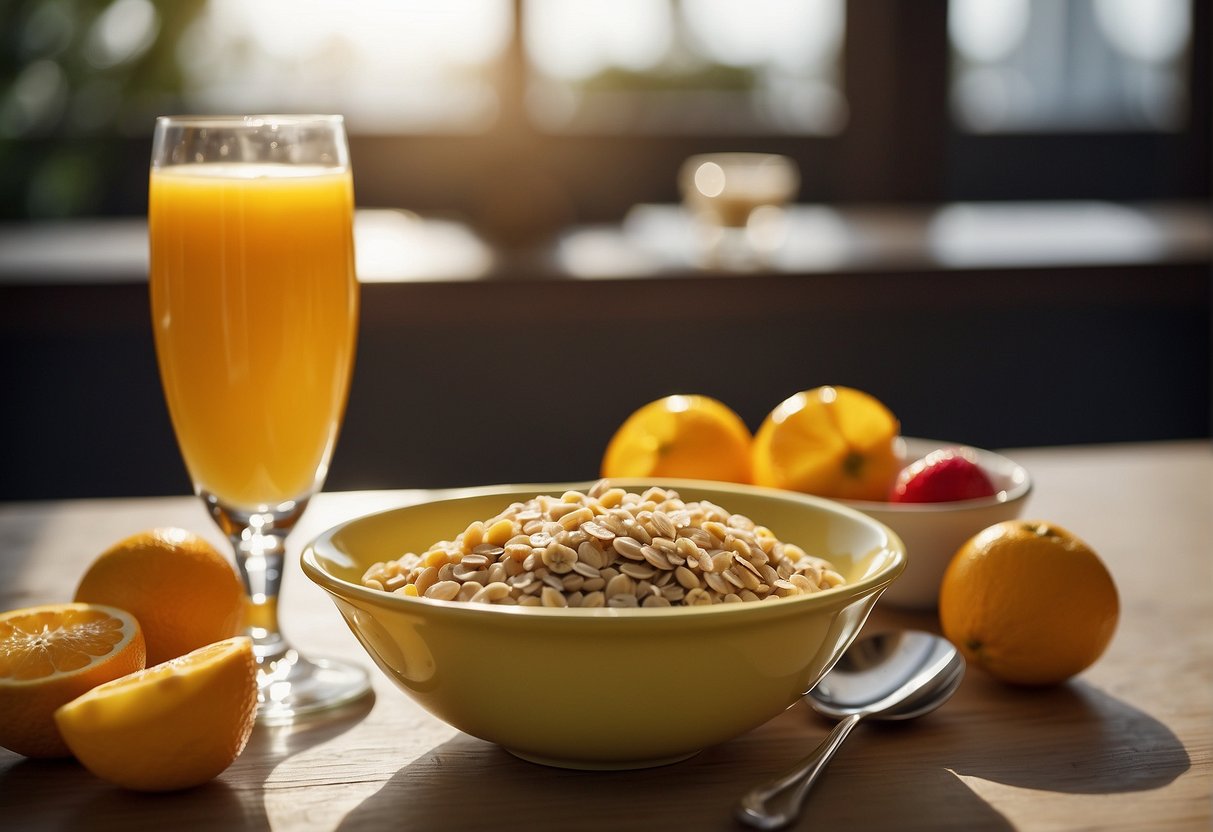
When it comes to fueling up before a run, runners need breakfast options that are nutritious and quick to prepare. Here are some focused ideas to start the day off with both convenience and energy in mind.
Breakfasts for Busy Mornings
For those mornings when time is of the essence, a smoothie can be a perfect choice. They require minimal preparation and can be packed with proteins and carbohydrates to energize a morning run. One could blend a banana, a scoop of peanut butter, and almond milk for a drink that’s quick to prepare and easy to digest.
Another efficient solution is a bowl of cereal with almond milk. Choose cereals high in fiber and whole grains to maintain energy levels. Adding a handful of granola to yogurt or cottage cheese can also conveniently boost proteins and carbs.
Make-Ahead Breakfast Options
Overnight oats are an excellent make-ahead option. One can mix rolled oats with almond milk or yogurt, leave them to soak overnight, and top them with fruit such as bananas in the morning for additional sweetness and nutrients.
Preparing a batch of granola bars during the weekend can save a lot of time for those who prefer to plan their breakfasts. These can include wholesome ingredients like oats, nuts, and seeds, and they’re easy to grab and go on busy mornings.
Best Breakfasts for Runners and Optimal Recovery

After a run, an athlete’s body needs nutrients to recover and repair muscles. Protein, essential for muscle repair, can be easily consumed as a smoothie with protein powder. Including protein powder accelerates muscle recovery, making it a staple in a runner’s breakfast.
Carbohydrates are equally important, as they replenish glycogen stores. A great option is sweet potatoes, which are rich in vitamins and fiber. Serving them as a part of a breakfast hash can optimize recovery.
Hydration is crucial, so incorporating milk—a natural source of electrolytes and protein—can benefit fluid recovery and calcium intake.
Adding chia seeds to a breakfast dish provides omega-3 fatty acids and fiber, supporting overall health and aiding in inflammation reduction. Sprinkling these seeds over oatmeal or yogurt enhances their recovery benefits.
For antioxidants that combat oxidative stress, runners should turn to berries. Blending these with spinach, which is high in iron and beneficial for blood health, creates a powerhouse smoothie for post-run recovery.
Eggs are a traditional breakfast choice that provides high-quality protein and essential amino acids. They offer a balanced meal aiding tissue repair when paired with spinach in an omelet.
Bananas are an excellent potassium source, aiding muscle function and preventing cramps. They can be sliced over cereal or blended into smoothies.
Lastly, a touch of honey can add natural sweetness, anti-inflammatory properties, and a quick energy source.
| Ingredient | Benefit |
|---|---|
| Protein Powder | Muscle Repair |
| Sweet Potato | Glycogen Replenishment |
| Chia Seeds | Omega-3s & Fiber |
| Berries | Antioxidants |
| Milk | Electrolytes & Protein |
| Eggs | High-quality Protein |
| Spinach | Iron |
| Banana | Potassium |
| Honey | Anti-inflammatory |
Runners should focus on a mix of protein, carbohydrates, and hydration post-run to promote recovery.
Special Dietary Considerations for Runners
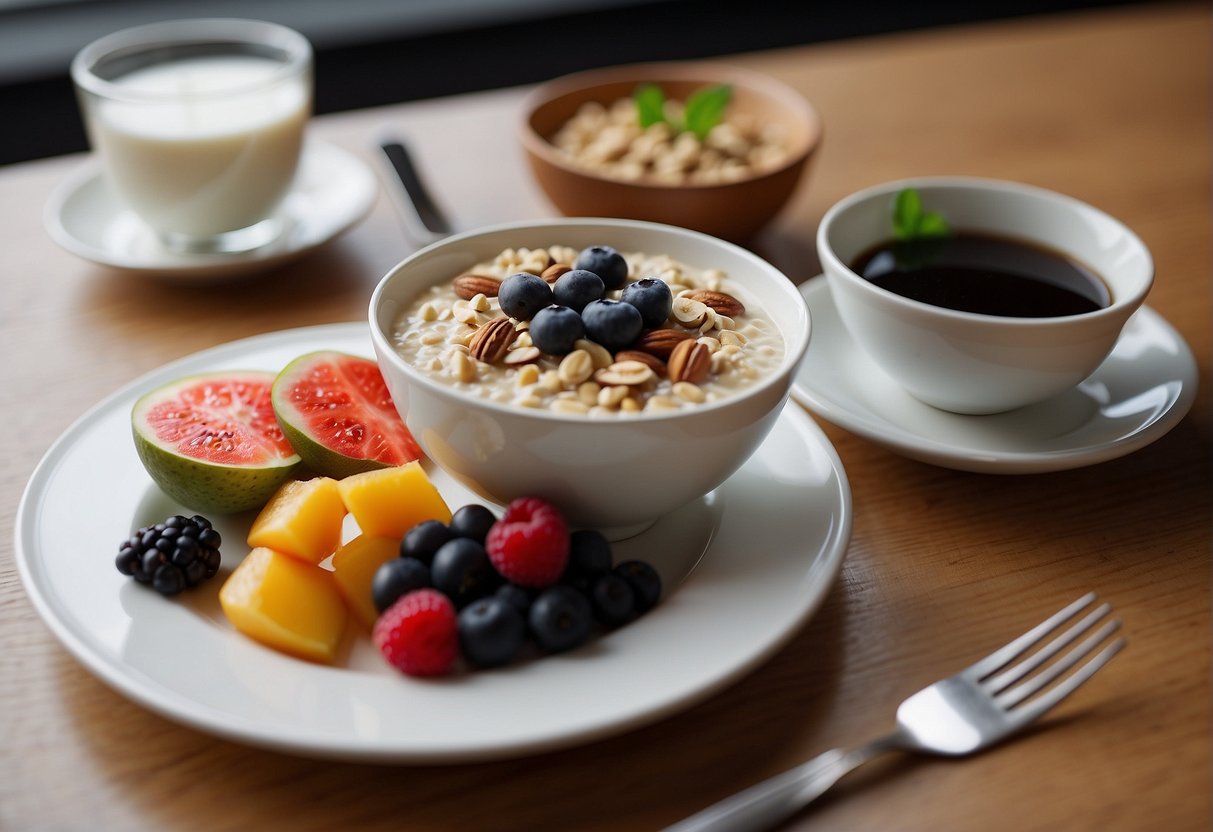
Runners often have specific dietary needs for peak performance and optimal recovery. Their breakfast choices must cater to different dietary restrictions while providing essential nutrients for energy and endurance.
Gluten-Free and Allergy-Friendly Choices
A gluten-free breakfast is crucial for runners with celiac disease or gluten sensitivity to prevent inflammation and maintain energy levels. Gluten-free options such as buckwheat pancakes or quinoa porridge offer a safe grain alternative. They can pair these with fruits and nuts for added fiber and nutrition without compromising taste or health.
Vegetarian and Vegan Breakfasts
A runner’s vegetarian or vegan breakfast can contain protein and other nutrients. Foods like chia seeds, fortified dairy alternatives, and yogurt made from almonds or coconuts provide a solid foundation. Vegetarian runners might opt for eggs as a high-quality protein source, while vegans can rely on seeds and nuts to fuel their runs.
Sensitive Stomach Solutions
Runners with a sensitive stomach require breakfast options that are easy to digest yet energy-boosting. Bananas offer quick, gentle carbohydrates, while oatmeal provides sustained energy without upsetting the stomach. Incorporating a dairy alternative such as almond milk can reduce potential issues lactose might present. It’s important to keep breakfasts simple and low in fat and fiber to ensure comfort during the run.
Supplements and Superfoods for Runners
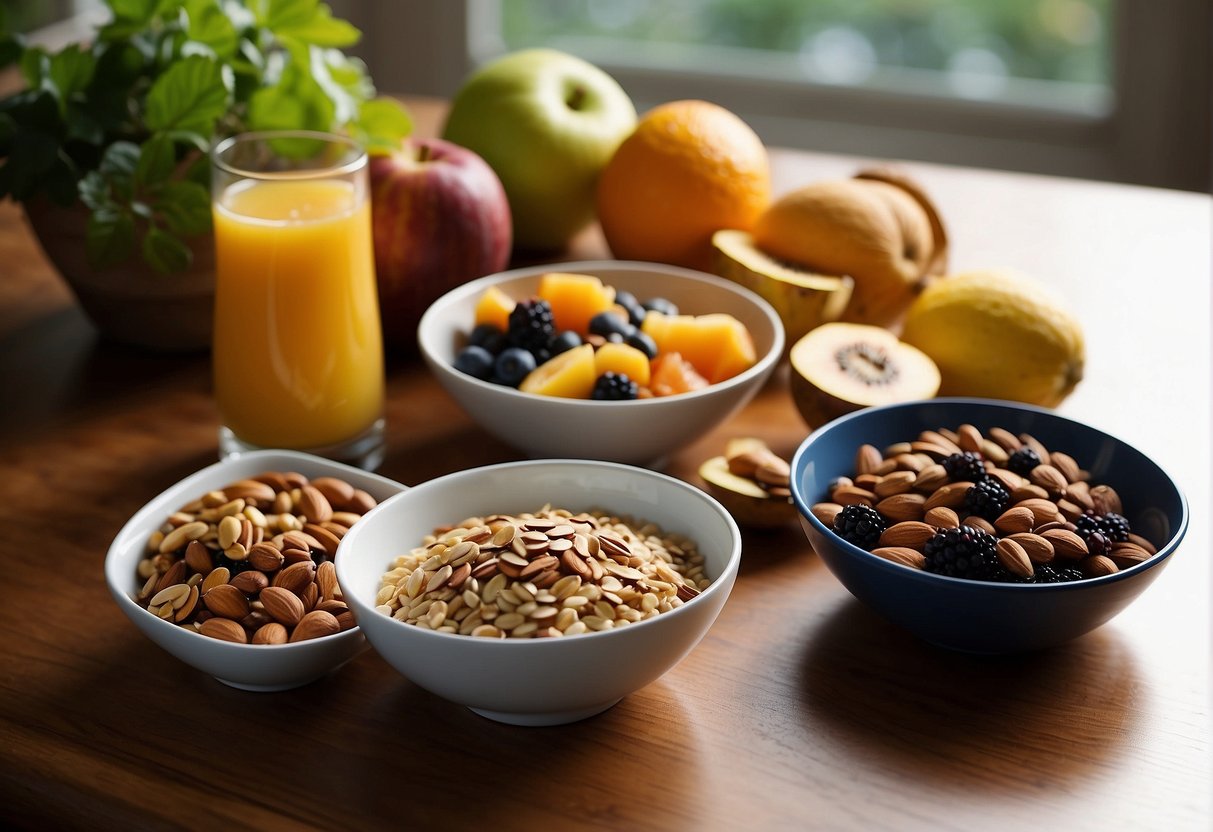
Runners need a balanced diet rich in nutrients to fuel their workouts and aid recovery. Including certain superfoods and supplements can be beneficial to their routine.
Protein powder: It is essential for muscle repair and growth. Runners can add it to smoothies or oatmeal for a post-run recovery meal.
Seeds: These are nutritional powerhouses.
- Chia seeds are high in omega-3 fatty acids and fiber, which are good for heart health and digestion.
- Flax seeds: Besides omega-3s, they contain lignans that may reduce inflammation.
- Hemp seeds: A complete protein source containing all nine essential amino acids.
- Pumpkin seeds are rich in magnesium, which is crucial for muscle function.
Vitamin C: This vitamin is an antioxidant that supports the immune system. Runners can benefit from citrus fruits or supplements, especially during intense training.
Mango: Not only is it hydrating, but it is also packed with carbohydrates and vitamin C, making it an excellent pre-run snack.
Berries: They provide carbohydrates and antioxidants, which can help with inflammation and recovery.
Nutritional yeast: This is a complete protein and includes B vitamins, which are fantastic for energy metabolism.
Spirulina: This blue-green algae is touted for its high protein content and anti-inflammatory properties.
A table summarizing the key components:
| Superfood | Key Benefit |
|---|---|
| Protein powder | Muscle repair |
| Chia seeds | Heart health, digestion |
| Flax seeds | Inflammation reduction |
| Hemp seeds | Complete protein source |
| Pumpkin seeds | Muscle function (magnesium) |
| Vitamin C | Immune system support |
| Mango | Energy (carbohydrates), immunity (vitamin C) |
| Berries | Antioxidants, inflammation reduction |
| Nutritional yeast | Energy metabolism |
| Spirulina | Protein, anti-inflammatory |
By incorporating these supplements and superfoods into their diet, runners can optimize their performance and overall well-being.
Conclusion
Starting the day with the best breakfast for runners is not just about choosing the right foods; it’s about embracing a lifestyle that prioritizes nutrition as a cornerstone of athletic performance and recovery. The ideal runner’s breakfast, rich in complex carbohydrates, lean proteins, healthy fats, and essential vitamins and minerals, sets the stage for optimal energy levels, muscle repair, and overall health. By focusing on nutrient-dense whole foods and effective combinations, runners can ensure they are providing their bodies with the fuel needed to excel in their training and recover efficiently.
Moreover, understanding the importance of hydration, electrolyte balance, and the timing of meals further enhances the benefits of a well-planned breakfast. Whether you are a competitive marathoner or a casual morning jogger, integrating these nutritional strategies into your daily routine can significantly improve your running performance and overall well-being.
Remember, the best breakfast for runners is one that supports your individual training needs, dietary preferences, and health goals. By making informed choices and experimenting with different foods and combinations, you can discover what works best for you and enjoy the journey towards achieving your running aspirations. Let your breakfast be the fuel that propels you forward, one step at a time, toward your fitness and health objectives.

